|
|
|
Sort Order |
|
|
|
Items / Page
|
|
|
|
|
|
|
| Srl | Item |
| 1 |
ID:
127610
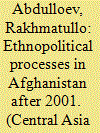

|
|
|
|
|
| Publication |
2013.
|
| Summary/Abstract |
Throughout the 20th century, domestic policy in Afghanistan unfolded under the influence of the ethnic factor. In 1929, the mainly Tajik Habibullah Kalakani movement ended the rule of Amanullah Khan; the National Democratic Party of Afghanistan, which split along ethnic lines, was another factor that brought about his downfall.
In 1992, the mujahideen came to power; this ignited ethnic confrontation and the country's de facto division into ethnically homogenous parts. The Islamist Taliban movement, which relied on the Pashtoon majority, established an unprecedentedly cruel regime and made the country the world center of terrorism and extremism.
In 2001, the International Conference on Afghanistan held in Bonn could not ignore the role of the ethnic factor; it figured prominently while the Constitution was discussed and later adopted, as well as during the parliamentary and presidential elections.
|
|
|
|
|
|
|
|
|
|
|
|
|
|
|
|
| 2 |
ID:
181014


|
|
|
|
|
| Summary/Abstract |
Concerns about electoral integrity have increasingly become the focus of political science analysis in recent years, but there has been very little systematic research on the strategic use of allegations of electoral wrong-doing for political advantage. Drawing on the literatures on legitimacy and electoral integrity, this paper develops a theoretical perspective on the strategic use of allegations of electoral impropriety for electoral ends, which, when such allegations are unjustified, constitutes a previously under-explored form of ‘meta-manipulation’. An original dataset, based on press reports from Turkey at the time of the 2014 local and June 2015 parliamentary elections, is used to test these hypotheses. The analysis shows that the governing party predominantly accused opposition parties of violent practices. The opposition parties, on the other hand, used allegations of electoral fraud and other forms of misconduct coupled with violence accusations against the governing party.
|
|
|
|
|
|
|
|
|
|
|
|
|
|
|
|
| 3 |
ID:
164322
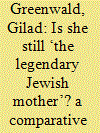

|
|
|
|
|
| Summary/Abstract |
In an attempt to demonstrate how historical changes in public opinion concerning women in politics might be reflected in the media, this article offers an examination of Golda Meir’s 1969 election campaign coverage in the Israeli press compared to Tzipi Livni’s in 2009. Through a gender-focused content analysis of 878 news items, we show how, despite the scholarly argument regarding a ‘gender-blind’ socio-historical attitude towards Meir, the Israeli media discourse did in fact strongly emphasise gender-oriented elements while covering her 1969 candidacy. However, the historical comparison also shows that, with the passage of time, the Israeli press was significantly affected by political personalisation trends, as well as by a growing influence of more conservative voices, and as a result became far more gender-centred and stereotypical in Livni’s case.
|
|
|
|
|
|
|
|
|
|
|
|
|
|
|
|
| 4 |
ID:
186301
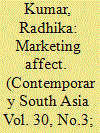

|
|
|
|
|
| Summary/Abstract |
Electoral campaigning in India is now effectively multi-modal and inhabits both the virtual and the real sphere. However, tools and techniques of campaigning vary across parties. The two parties that this paper focuses on, the BJP and the AAP, are known for running highly organized campaigns marked by their intensity and voter reach. The paper looks at the specific case of the Delhi assembly elections of 2015 and 2020 to compare strategies and the election campaign of the two parties. The paper argues that while the campaign of both parties was methodical and micro-managed, the selection of electoral issues and customization of the campaign to the addressed audience varied. The parties are comparable in terms of being leader centric, tending towards the personalization of politics, and both conducted professionalized campaigns, yet the political marketing of the element of affect differed. To demonstrate this, the paper firstly draws on literature in the field of political communication to illustrate the role of emotions, or the aspect of affect, in an electoral campaign. Secondly, through a perusal of media reportage and analysis, the paper traces the process by which personalization was manifested and how the narrative of affect came to be framed in the election campaign.
|
|
|
|
|
|
|
|
|
|
|
|
|
|
|
|
| 5 |
ID:
176089


|
|
|
|
|
| Summary/Abstract |
Political parties use different methods—such as holding rallies, door-to-door canvassing, and distributing gifts—to mobilize voters during election campaigns across Africa. But how do parties choose which approach to use in each constituency? We propose that parties prefer to hold rallies in core constituencies, and to use targeted strategies—canvassing and handouts—in swing and opposition districts. However, opposition parties may not have sufficient resources to pursue such a strategy. Ruling parties have the dual advantage of being in a strong financial position, and having the ability to target core voters with state benefits between elections. Using post-election survey data from Ghana’s 2012 election, we show that the ruling party canvassed the most in districts where they were electorally weak and concentrated rallies in their home constituencies. In contrast, the opposition party focused all of its efforts in its home districts. The results highlight how incumbency status shapes parties’ campaign behaviour. They also suggest that ruling parties can combine core and swing voter targeting in different stages of the electoral cycle.
|
|
|
|
|
|
|
|
|
|
|
|
|
|
|
|
| 6 |
ID:
113203
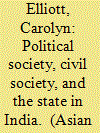

|
|
|
|
|
| Publication |
2012.
|
| Summary/Abstract |
This article is an ethnography portraying the processual and performative dimensions of the 2009 state assembly election in Andhra Pradesh. It shows how upper castes have persisted in power in a multicaste and increasingly democratic society through the distribution of welfare and patronage benefits to more marginalized segments of society. Conceptually, it argues for the importance of "political society" over "civil society," when examining state-society relations in neoliberal, democratic India.
|
|
|
|
|
|
|
|
|
|
|
|
|
|
|
|
| 7 |
ID:
119583
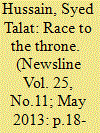

|
|
|
|
|
|
|
|